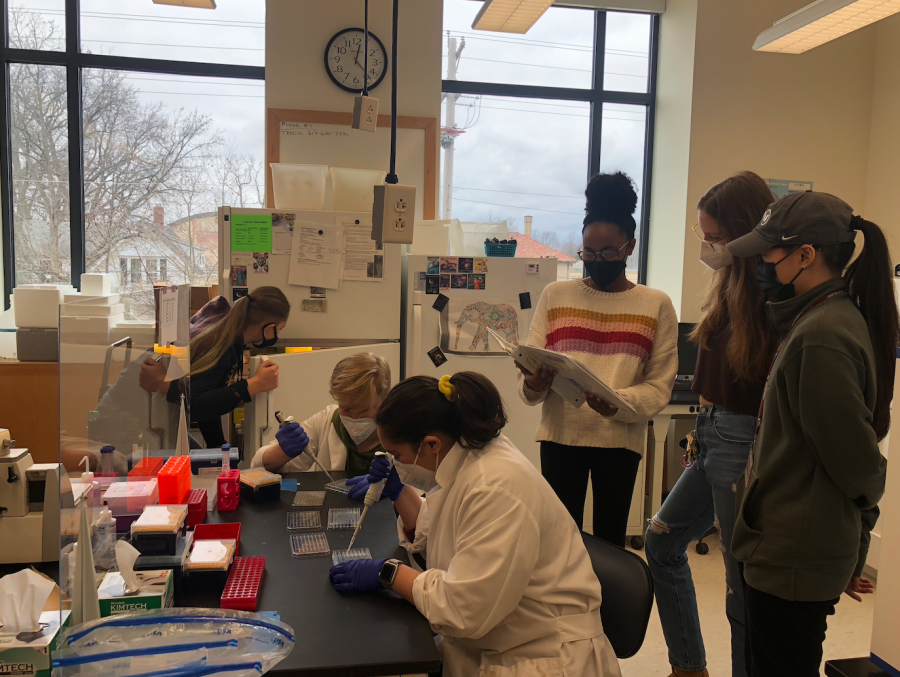Office of Undergraduate Research Announces New Summer Research Program
The Office of Undergraduate Research’s new initiative, Oberlin Summer Undergraduate Research Fellowship, gives students the opportunity to conduct quantitative research.
Last week, the Office of Undergraduate Research announced the launch of the Oberlin Summer Undergraduate Research Fellowship, a new research program in which participants stay on campus over the summer to complete an eight-week quantitative research project with faculty mentorship.
OSURF applicants must propose their own quantitative research project and find a faculty mentor to sponsor their project. If selected to participate, students receive a stipend, on-campus housing for the entire program period, and the opportunity to participate in personal and professional development programming as well as community-building activities.
According to OUR Director Leslie Kwakye, OC ’06, and Associate Director Angela LaGrotteria, OUR established OSURF to create in-person quantitative research opportunities for Oberlin students, which the COVID-19 pandemic limited in previous years. Additionally, many Oberlin faculty members provide unofficial research opportunities without compensation from the College, so the OSURF program will offer faculty mentors a stipend in support of their work.
“OSURF is expanding on-campus research opportunities for the students most affected by the loss of summer research experiences (mostly students in quantitative areas) whose research depends on intensive mentorship,” Kwakye and LaGrotteria wrote in an email to the Review.
OSURF differs from OUR’s other cohort programs — such as the Mellon Mays Undergraduate Fellowship, the Oberlin College Research Fellowship, and Science and Technology Research Opportunities for a New Generation — as applicants do not need to come from a historically underrepresented background to apply. However, Kwakye and LaGrotteria maintain that OSURF will still promote diversity, equity, and inclusion.
“OUR designs all of its programming through a diversity, equity, inclusion, and justice lens,” they wrote. “The ways in which each program promotes DEIJ differ, and OUR hopes that all our programs will complement each other to result in a vibrant, welcoming, and diverse environment of student researchers across all disciplines at Oberlin.”
OSURF also differs from MMUF and OCRF in that research fellowship projects must revolve around quantitative research, which includes quantitative social science fields and natural science fields. In contrast, MMUF participants must complete research in the humanities and social sciences, and OCRF participants can complete research in any field.
“My concern is that [the program] will be too open and there’s going to be way less underrepresented students and a lot more of the majority,” said College second-year and prospective OSURF applicant Arya Menon.
While OSURF fellows do not need to exclusively come from underrepresented identities, OSURF applicants must demonstrate commitment to fostering diversity and inclusivity in their fields, according to Kwakye and LaGrotteria. The two also emphasized OUR’s commitment to addressing any problematic community dynamics that may arise in the program so that underrepresented students feel supported and so that allies to these students can improve their ability to foster inclusive educational environments.
College second-year and Psychology major Nevaan Bawa expressed interest in applying to conduct psychology research through the program. Bawa said they appreciated that OSURF gives them the freedom to conduct their own research project over the summer with a professor of their choice, as compared to summer research programs at other organizations where student researchers have no choice in what or with whom they conduct research. According to Bawa, OSURF also offers a competitive stipend compared to other summer psychology research programs.
“I’m comparing [OSURF] to other psychology programs outside of Oberlin,” Bawa said. “I feel like [OSURF] is more fitting for me.”
Menon also mentioned that the Psychology department does not currently have many labs with open research positions, making research opportunities somewhat scarce. OSURF offers her an opportunity to conduct psychology research without having to wait for a lab position to open up.
“There are very few [Psychology] professors that are doing research in labs that have open spots,” she said. “So, if you want to do research, options are very limited, and the kind of research is also very limited. So having this opportunity over a summer to do whatever I’m interested in and still getting real research experience is really nice.”
Still, Bawa and Menon have a few concerns about the program. Both students expressed their hesitation to ask professors to act as their OSURF mentors, considering that several Oberlin professors taught year-round during the 2020–21 academic year and have not had an extended break since summer 2020.
“I feel like you’re kind of burdening [professors] by asking them to be your mentor,” Bawa said.
However, Kwakye and LaGrotteria emphasized that potential OSURF applicants should not hesitate to reach out to potential mentors.
“If they feel that they need a long summer break and are unavailable to mentor you, they will let you know,” they wrote. “Mentors may be waiting for students to reach out to them!”
Additionally, although the opportunity to propose an independent research project offers OSURF participants freedom, it also makes the application intense and somewhat daunting, according to Bawa. OSURF applicants must choose a research topic and outline how to conduct this research, which may pose difficulties for those without extensive prior research experience.
“I don’t like how intense the application is,” Bawa said. “I feel like … it’s too much on top of already doing school.”
Kwakye and LaGrotteria maintained that OUR designed the application so the OSURF selection committee can assess applicants’ compatibility with the program and that the process of completing the application will prepare OSURF participants to start their research projects. Additionally, applicants have support from their mentor and the OUR office during this process.
“We are happy to help students with applications!” they wrote.
OSURF applications are due April 15, and applicants can reach out to the Office of Undergraduate Research for assistance.







